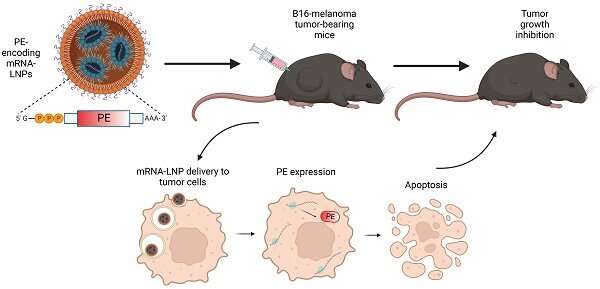Researchers induce cancer cells to ‘commit suicide’ with a self-produced bacterial toxin

For the first time in the world researchers at Tel Aviv University have encoded a toxin produced by bacteria into mRNA (messenger RNA) molecules and delivered these particles directly to cancer cells, causing the cells to produce the toxin—which eventually killed them with a success rate of 50%.
The groundbreaking study was led by Ph.D. student Yasmin Granot-Matok and Prof. Dan Peer, a pioneer in the development of RNA therapeutics and Head of the Nanomedicine Laboratory at the Shmunis School of Biomedicine and Cancer Research, also serving as TAU’s VP R&D. The study’s results were published in Theranostics.
Prof. Peer explains, “Many bacteria secrete toxins. The most famous of these is probably the botulinum toxin injected in Botox treatments. Another classic treatment technique is chemotherapy, involving the delivery of small molecules through the bloodstream to effectively kill cancer cells. However, chemotherapy has a major downside: it is not selective, and also kills healthy cells. Our idea was to deliver safe mRNA molecules encoded for a bacterial toxin directly to the cancer cells—inducing these cells to actually produce the toxic protein that would later kill them. It’s like placing a Trojan horse inside the cancer cell.”
First, the research team encoded the genetic info of the toxic protein produced by bacteria of the pseudomonas family into mRNA molecules (resembling the procedure in which genetic info of COVID-19’s spike protein was encoded into mRNA molecules to create the vaccine).
The mRNA molecules were then packaged in lipid nanoparticles developed in Prof. Peer’s laboratory and coated with antibodies—to make sure that the instructions for producing the toxin would reach their target, the cancer cells. The particles were injected into the tumors of animal models with melanoma skin cancer. After a single injection, 44–60% of the cancer cells vanished.
“In our study, the cancer cell produced the toxic protein that eventually killed it,” says Prof. Peer. “We used pseudomonas bacteria and the melanoma cancer, but this was only a matter of convenience. Many anaerobic bacteria, especially those that live in the ground, secrete toxins, and most of these toxins can probably be used with our method. This is our ‘recipe,’ and we know how to deliver it directly to the target cells with our nanoparticles.”
“When the cancer cell reads the ‘recipe’ at the other end it starts to produce the toxin as if it were the bacteria itself and this self-produced toxin eventually kills it. Thus, with a simple injection to the tumor bed, we can cause cancer cells to ‘commit suicide,’ without damaging healthy cells. Moreover, cancer cells cannot develop resistance to our technology as often happens with chemotherapy—because we can always use a different natural toxin.”
More information:
Yasmin Granot-Matok et al, Lipid nanoparticles-loaded with toxin mRNA represents a new strategy for the treatment of solid tumors, Theranostics (2023). DOI: 10.7150/thno.82228
Citation:
Researchers induce cancer cells to ‘commit suicide’ with a self-produced bacterial toxin (2023, July 4)
retrieved 4 July 2023
from https://phys.org/news/2023-07-cancer-cells-commit-suicide-self-produced.html
This document is subject to copyright. Apart from any fair dealing for the purpose of private study or research, no
part may be reproduced without the written permission. The content is provided for information purposes only.
For all the latest Science News Click Here
For the latest news and updates, follow us on Google News.

